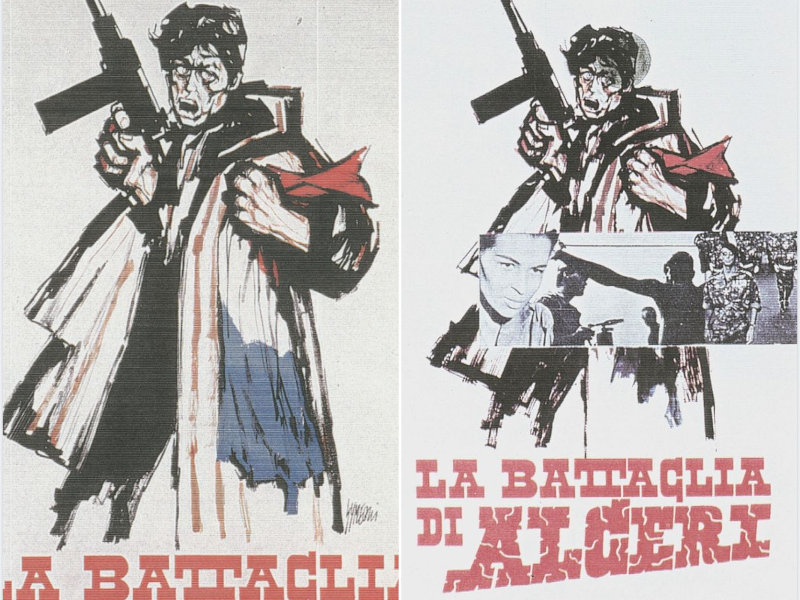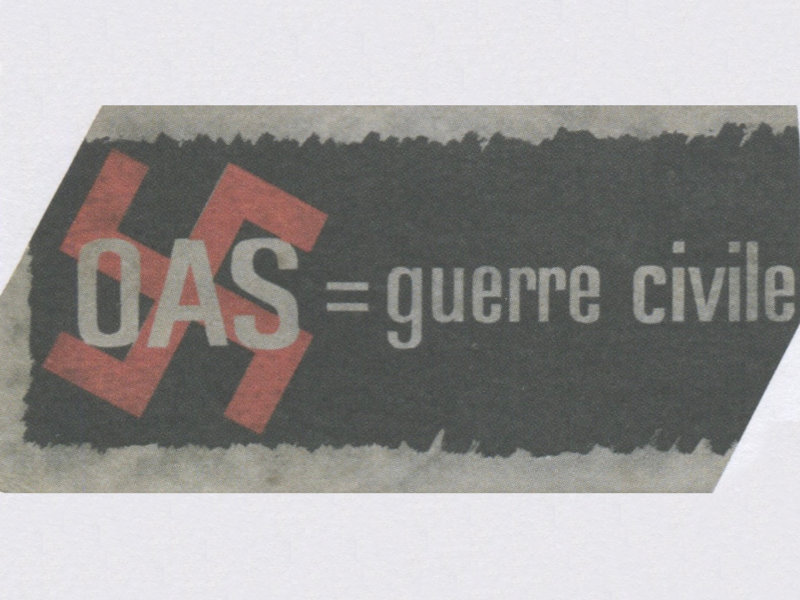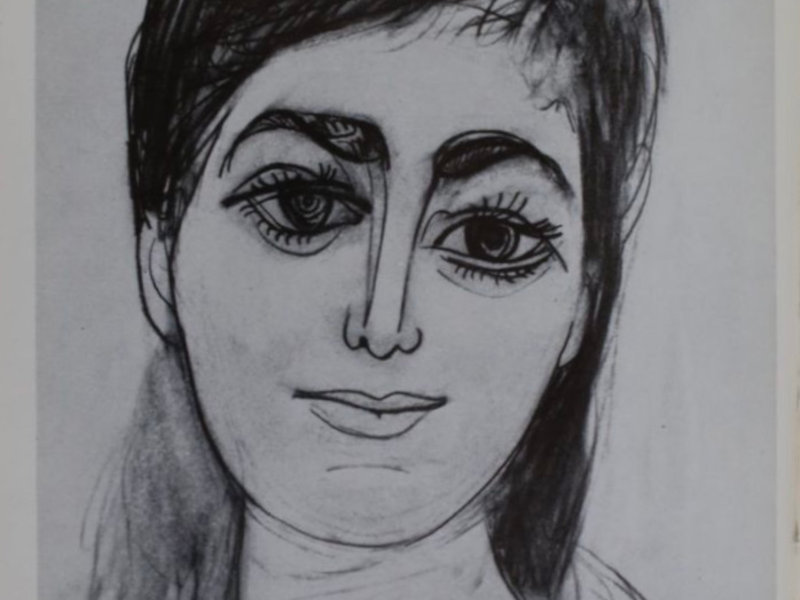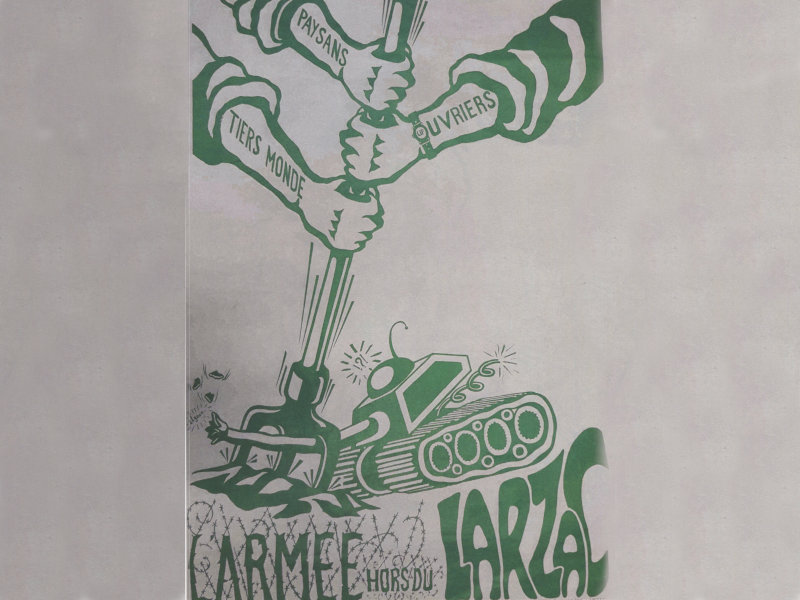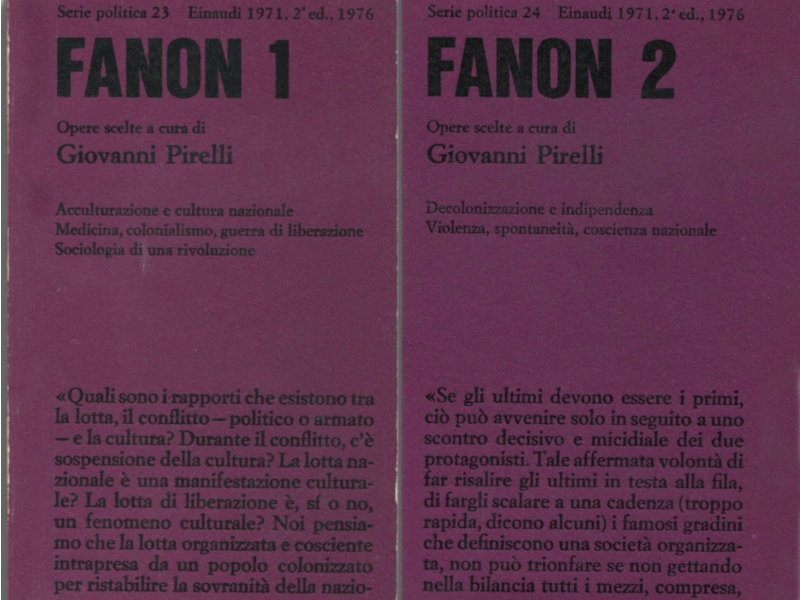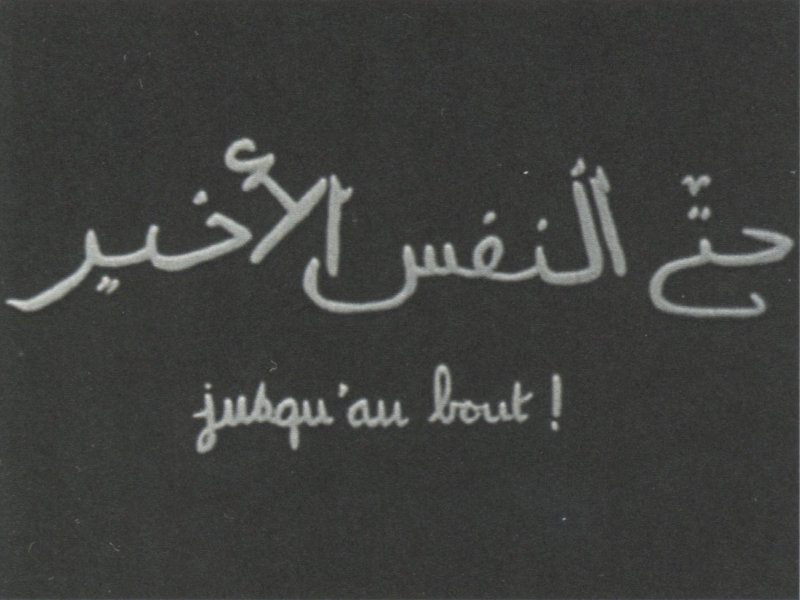The Damned
Algeria, antifascism, and Third Worldism: An anticolonial genealogy of the Western European New Left (Algeria, France, Italy, 1957-1975)
Overview
THE DAMNED proposes a new study of the genealogy of the New Left in Western Europe from the mid-1950s to the mid-1970s. Breaking with current interpretations, the project reframes the European political geography to include the (post)colonial space, and reassesses the historical influence of the Algerian War of Independence (1954–1962) – and Third Worldism more generally – in the genealogy of the new political cultures that flourished during the ‘long 1960s’, associating a renewed antifascism with anticolonial struggles. Bringing together disciplines and methodologies from across a number of humanities and social sciences, THE DAMNED will produce a case study (focusing on Algeria, France and Italy) setting out new approaches to understanding the emerging of the New Left as a complex process encompassing local, national and transnational dynamics; a process shaped by, but also shaping, decolonisation. The goal is to contribute – at least – to complicating the Western narrative of the global 1960s, by shifting the focus from Berkeley and Paris to Algiers.
THE DAMNED is to be carried out mostly in Algeria, with a secondment in France and a return phase in Italy. Working with leading experts in each of these countries, the aim is to develop a truly transnational, interdisciplinary network exploring anew the global 1960s. By means of an extensive oral history project interviewing anticolonial activists, THE DAMNED will create a repository of sources for researchers, with a selection of interviews accessible online. THE DAMNED has been designed to ensure a mutually beneficial exchange of knowledge between the researcher and the third country (Algeria):
‘The challenge is to improve the design of cultural experiences by enhancing participatory and collaborative approaches and by fostering mutual cultural understanding and resilient strategies’, as stated in the H2020 Work Programme 2018–20.
Project
The New Left developed in various Western countries from the mid-1950s onwards, contemporaneous with the processes of decolonization. This Left moved outside the established organizations of social democracy, communism, and Left Catholicism, and indeed became harshly opposed to them. In this process, radical anticolonialism was its key distinguishing feature. The New Left framed the anticolonial struggle as a new antifascism by comparing groups such as the Algerian liberation movement to the Second World War Resistance, and their enemies to the Nazis and their fascist allies. The strong engagement of French intellectuals against the practise of torture during the Battle of Algiers (1957) transposed the Algerian War into a European ethical divide.
The ‘Battle of Algiers’ – perhaps not so much the reality as the movie (1966) by the Italian director Gillo Pontecorvo (former partisan and communist) – marked the New Left deeply. A generation of activists re-appropriated the narrative of the Resistance as not merely defensive but proactive, merging the myth of the ‘betrayed Resistance’, still to be accomplished because severed from the social revolution, with the image of imperialism as the ‘new fascism’. The European civil war, identified by Enzo Traverso as the main feature of the first half of the twentieth century (1914–45), was hence reconfigured anew worldwide as a ‘global civil war’, driven by the Algerian War.
The Damned focuses on the cultural and practical consequences for the activists of the long 1960s (mid-1950s to mid-1970s) of this re-activation of the antifascist front. For many, the Algerian War would be a shifting point in their political education. Echoing The Damned of the Earth – from the first line of the French version of The Internationale, used by Frantz Fanon as the title of his famous work (Les Damnés de la terre/The Wretched of the Earth, 1961) – these activists would often become ‘the damned’ of the revolution. The replay of the fascism/antifascism divide within a new global civil war would configure an ethical disjuncture out of which emerges the idea of ‘absolute enmity against an absolute enemy’. This concept was proposed by Carl Schmitt in his Theory of the Partisan: published in 1963, the book was deeply influenced by the author’s experience during the Second World War and by the guerrilla warfare of the recently ended Algerian War. The Damned contends that this global civil war framework is a key feature of the new political cultures that emerged during the long 1960s, triggered by decolonization and the Cold War. This global civil war framework also had significant consequences for the process of social legitimization of political violence in relevant sectors of the New Left.
The Damned seeks to test the hypothesis that the Algerian War – despite having received relatively little attention by most scholars of the long 1960s – occupies a core place in the genealogy of the New Left, having set the political and conceptual framework – namely the global civil war – by which the victory of Castro and Guevara (Cuba, 1959) or the triumph of the Vietcong (Tet Offensive, 1968) would be later understood. Although Cuba and Vietnam certainly became key references in the revolutionary canon, they took place far from Europe. Exactly because of this distance, they would progressively supersede Algeria in the New Left radical pantheon, offering a more useful screen for a projective (and exotic) political imagination. Algeria was different: not only because of its position on the southern shore of the Mediterranean basin, but also because of its specific ‘interior exteriority’ for European political geography – did not de Gaulle say: ‘La Méditerranée traverse la France comme la Seine traverse Paris’? Thus, we may indeed ask what, after independence, was Europe, and what was not; what was Algeria, and what was not?
The perspective that The Damned adopts thus moves beyond standard histories of political parties or international relations, and turns to the ‘cultural history of politics’. The Damned studies the anticolonial networks in and among Italy, France, and of course Algeria – the ‘Mecca of revolution’, as it was called – seen as a key element of the global 1960s. The periodization that the project seeks to test takes as terminus post quem the ‘Battle of Algiers’ (1957) and as terminus ad quem the fall/liberation of Saigon (1975): The Damned contends that, for the transnational public of the New Left, the first marks the short circuit between the Algerian War and the memory of the Holocaust and the Second World War, while the second marks the end of Third Worldism as a political project.
Objectives
The Damned will produce the first connected history of the anticolonial genealogy of the Western European New Left, focussing on Algeria, France and Italy where the networks supporting the Algerian Revolution were most effectively operational. With a view to articulating this general objective, the project will follow three interrelated lines of enquiry and pursue three specific objectives:
a) Exploring transnational networks
The Damned tests the hypothesis that it was during the Algerian War that radical anticolonialism started to imagine itself as a new antifascism, connecting with a proactive memory of the Resistance. The Algerian War, in fact, was not only the inverted replay of the Second World War (this time with the French in the role of the Nazis), but Algeria was in all respects part of the history of the European antifascist struggle: ‘Algerian’ soldiers had fought for the liberation of Europe in the French army and, while de Gaulle was in London, Algiers was the capital of ‘France libre’. In this perspective, looking to the anticolonial networks in and among Algeria, France and Italy, the project focuses on the lives, experiences and memories of grassroots activists – women and men – who, in different ways, engaged in these networks. Who were they? Why and how did they get involved? What were their tasks or desires? With which other networks were they in touch? How do they represent their ‘enemy’, and therefore their Selves? And 60 years later, how do they compose their memories of this anticolonial militancy? Moreover, to what extent did Algerians, French and Italians share a common ethos, if any? What were the reciprocal influences between the New Left and the Algerian Revolution, before and after independence? Specific attention is paid to the gender dimension. Many women fought in the Algerian War: were they as influenced by Western models as much as they would influence them, through figures such as Djamila Boupacha, from the Algiers bombing network?
b) Mapping political cultures
The Damned pursues a diachronic study (mid-1950s to mid-1970s) of how established organizations of the Left (Socialists, Communists, part of the Christian Democrats, etc.) coped with decolonization and more specifically with Algeria. Why did this become unsatisfactory for a growing number of activists, giving birth to what would later be called the New Left? And conversely, in which ways – if any – was the ‘horizon of expectation’ of the Algerian National Liberation Front (Fln), and later also of the opposition movements (Ffs, Berbers, etc.), influenced by the rising New Left (particularly through coopérants and pieds-rouges)?
The project explores and tests the consistency of these new transnational political cultures, sometimes overlapping with but also progressively exceeding the Cold War cultures. Specific attention is paid to the issue of political violence, aiming to better understand the relation between the global civil war and the radicalization of the repertoires of collective action.
c) Analysing cultural infrastructures as vectors of transnational connections
The circulations of people, ideas, texts, images and songs was a prominent feature of the Algerian War. The Damned builds on this to highlight the emergence of a new transnational public since the 1950s. Particular attention is paid to the networks of ‘intellectuals’ who played a pivotal role in the process of transnational dissemination of ideas and mobilization models.
A few small independent publishers (e.g. éditions de Minuit and Maspero in France, Feltrinelli in Italy, etc.) or libraries (e.g. Librairie du Tiers Monde, which opened in Algiers in 1965) made a substantial contribution to promoting a new political agenda. In line with this approach, The Damned studies the translations, circulations and receptions of the work of Fanon, a key figure of Algeria, Third Worldism, and the New Left.
Publications
- ‘Cold War Warriors or New Left Internationalists? Algerians students and French coopérants in the Global 1960s’, in Educational Internationalism in the Global Cold War, ed. by Damiano Matasci & Raphaëlle Ruppen Coutaz, Routledge, New York and London, 2023, forthcoming.
- ‘“Algeria, Francia: una ‘storia d’amore”? Oltre una memoria nazionalista, colonialista e patriarcale’, Il Ponte, 2022, pp. 94-111
- ‘“Bandung capitale del mondo”. Il 1960, l’Algeria e il tempo dell’Africa’, Annale AAMOD, 2022, n. 22, pp. 33-46
- ‘Algeria, 5 luglio 1962-2022: Questioni di guerra rimaste in sospeso’, il manifesto, 2 July 2022
- "La Francia e la guerra d'Algeria. Il «Rapporto Stora» tra uso politico del passato e conflitti del presente", Storica, n. 78, 2021, pp. 7-32
- Faire l'histoire de violence en guerre. Annette Becker, un engagement, edited by Andrea Brazzoduro, Ken Daimaru, Fabien Théofilakis, Paris, Créaphis, 2021.
- ‘L’Algeria sessant’anni dopo: una prospettiva postcoloniale tra Roma, Parigi e Algeri’, in Simonetta Soldani, Gli "anni dell’Africa". Riflessioni e memorie su una cesura epocale, Passato e presente, 2021, vol. 39, n. 114, pp. 7-40
- ‘“Se un giorno tornasse quell’ora”. The new left between anti-fascist legacy and third worldism’, Italia contemporanea, n. 296, 2021, pp. 255-275
- 'Oltre la trappola del presentismo', Il De Martino. Storie voci suoni, n. 31, 2021, pp. 199-205
- 'La retata. Un’intervista con Enzo Traverso', Zapruder. Storie in movimento, May 2021 (on line: translated into English, French, German, Spanish, Greek)
- 'Reconsidering the history of Algerian independence: a book review essay', Journal of North African Studies, published online: 16 Feb 2021
- Review | ‘Neelam Srivastava, Italian Colonialism and Resistances to Empire, 1930-1970 (Palgrave Macmillan 2018)’, Modern Italy, Volume 25, Special Issue 4: Italians Beyond Italy/Italy Beyond Italians: Transnational Cultural Strategies and the Construction of Identities, November 2020, pp. 478-480
- Review | ‘Claire Eldrige, From Empire to Exile: History and memory within the pied-noir and harki communities, 1962–2012 (Manchester, Manchester University Press, 2016)’, Parlement[s], hors série n. 15, 2020, Les lois mémorielles en Europe, pp. 242-244
- ‘Algeria, Antifascism, and Third Worldism: An anticolonial genealogy of the Western European New Left’, Journal of International and Commonwealth History, vol. 48, n. 5, 2020, pp. 958-978
- ‘Algeria pandemica. Lotte e repressione nell’emergenza sanitaria’, Gli Asini, nn. 78-79, 2020, pp. 60-63
- Review | ‘Mariamargherita Scotti, Vita di Giovanni Pirelli. Tra cultura e impegno militante, Donzelli 2018’, Italia contemporanea, n. 292, 2020, pp. 245-246
News and events
- Conference | Paris, 6-8 December 2022: Memories of Colonial Pasts: Perspectives on a Global Phenomenon of the Present Time [FRA]
- Conference | Rome, 25-26 November 2022: Chair and discussant at the international conference ‘Punitive regimes and political regimes in the European and colonial world’ [ITA]
- Conference | Rome, 12-13 October 2022: ‘France in Algeria, Algeria in France. Notes on the project of the ‘Museum of France and Algeria’
- Workshop | Rome, 21 July 2022: ‘Algeria-Italia, 1962-2022. Percorsi cinematografici’ [ITA]
- Conference | Oxford, 13-14 May 2022: ‘Opferbilder'. The visualization of victimhood after 1945 [DEU]
- Book launch | Oxford, 29 April 2022: 'Algiers’ lynching, 1956. A social history of colonial racism'
- Conference | Paris, 1 April 2022: Une guerre civile globale? Théories et pratiques de liberation entre antifascism et décolonisation [FRA]
- Interview with Lynda Tamdrari | Canal Algérie, 27 March 2022: “Notre Algérie”
- Round-table | Algiers, 27 March 2022 (Salon international du livre d’Alger): Guerre d’indépendence, la solidarité du peuple italien envers la cause algérienne [FRA]
- Conference | Paris, 20-22 January 2022: "Colloque Colonisation et guerre d’Algérie : oppositions intellectuelles" [FRA]
- Round-table | Milano, Fondazione Feltrinelli, 4 December 2021: "Sartre, la sinistra francese e il massacro di stato del 17 ottobre 1961" [ITA]
- ‘Il massacro di Parigi e il razzismo di stato contro gli algerini’, MicroMega [ITA], 15 October 2021
- ‘17 ottobre 1961: a sessant’anni dalla repressione degli algerini, fare i conti con il razzismo strutturale’, Fondazione Feltrinelli [ITA], 15 October 2021
- Conference | Kent, 5-9 July 2021: «“What is to be done?” - The Arab New Left in the ‘long 1960s’ - Investigating Transnational Entanglements»
- Conference | Lausanne, 23-25 June 2021: «Internationalism(s) and Education during the Cold War. Actors, Rivalries and Circulations»: Cold War Warriors or New Left Internationalists? Algerians students and French coopérants in the Global 1960s
- Book launch | Oxford, 11 June 2021: 'Dad, what did you do in Algeria? An investigation into a family silence' Oraganization and discussant with Raphaelle Branche, James McDougall and Robert Gildea
- Interview to the Swiss Radio (RSI), 17 May 2021
- Florence Beaugé mentioned my work in the French paper "Le Monde" [FRA] (17 March 2021): ‘Guerre d’Algérie : le tabou des viols commis par des militaires français’
- Seminar [ITA] | 4 March 2021: ‘How communism became global. Building connections between Soviet, European and African communists’
- Book launch [ITA] | 21 November 2020: Testimonianze e testimoni nella storia del tempo presente, a cura di Gabriella Gribaudi, edipress 2020
- Convenor of the seminar «Doing History Differently: Generation Independence: Algeria, a people’s history’ », with Walid Benkhaled (Potsmouth), Toufik Douib (Londres), Natalya Vince (Portsmouth), James McDougall (Oxford) (Oxford, 11 March 2020)
- Conference | Rome, 12-14 December 2019: "A minor history? The Western communists, anti-imperialism and decolonisation in Africa"

